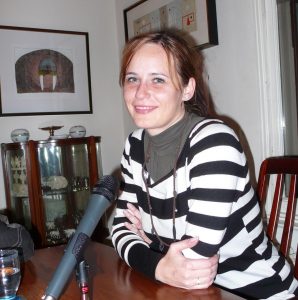January 12, 2013
By Kevin Burns
 Eszter Szenczi arrived in Canada to see first-hand a culture she had only read about in books back home in Hungary. She was one of 32 European graduate students who took part in the 2012 Thinking Canada study tour of Canada.
Eszter Szenczi arrived in Canada to see first-hand a culture she had only read about in books back home in Hungary. She was one of 32 European graduate students who took part in the 2012 Thinking Canada study tour of Canada.
Thinking Canada is an initiative of the European Network for Canadian Studies funded for the last several years by the European Commission, various European associations of Canadian studies and the participating students themselves. It has been organized and administered by the European Network for Canadian Studies and by Capilano University. Over a four week period, European student participants interested and involved in Canadian studies meet in Brussels for preliminary briefings before the longer Canadian portion of the tour which sees them travel to Victoria, Vancouver, Toronto, Montreal, Quebec City, and Ottawa to meet with government officials, representatives from public and private institutions, NGOs, and other organizations.
Eszter was one of the fortunate participants who followed-up the study tour with a 2 month internship, through the support of the Canada-Hungary Educational Foundation / Fondation éducative Canada-Hongrie (CHEF).
After just a few days with the Canadian Conference of the Arts, Eszter learned something very important about the fragility of Canadian cultural institutions. This not-for-profit organization folded after 67 years of service to the Canadian cultural community. Fortunately for Eszter, CHEF was able to find her a welcoming home at the Canadian Museum of Civilization where she concluded her internship working on a project linked to Eszter’s graduate work in Hungary: Métis culture.
In a conversation for the CHEF website, Eszter explained how her English and French studies in Hungary led her to a PhD program at Eötvös Loránd University where she became interested in “the unique situation of the Métis in Canadian society.” Her research is in “cultural hybridity.”
Eszter explains:
Although meeting with Métis people in Canada helped fill-in some of the gaps between book-based research and direct experience, she says it reinforced her interest in education as a process of transformation. As a teacher she has learned a great deal that she can take back to her students. “I always see education as a solution,” she says. “I try to encourage my students to be open-minded, to be tolerant, to accept difference, to be open to argument and able to express opinions. I think that’s the basic message.”
Eszter was especially interested in Canada’s multiculturalism. “I came here in September with 32 people from Europe. It’s so nice to see people from all over the world and see that we are different and that we can live side-by-side very happily.” The group’s own experience mirrored what she observed in Canada.
Eszter’s comments on Canadian openness:
Returning to Hungary is going to be a challenge, even after such a short visit to Canada, explains, Eszter. “As a teacher you cannot really manage to make it on your own or to be independent. It’s very hard at the moment. I hope to finish my PhD studies first and that this will open some doors for me. But I’m not sure that those doors are in Hungary.” Like many graduate students around the world, work opportunities after graduation can be uncertain. But as Eszter says, it’s all a matter of knowing that an individual can make a difference, even when your prospects seem limited. She envisions a future career in social engagement of some kind, which may or may not involve teaching.
What she will miss when she leaves Canada:
The future of the Thinking Canada project is now uncertain. As the announcement says on the European Commission’s website: “At the moment we cannot say whether the “Thinking Canada” study tour and internship program will be taking place again in 2013. This depends on our obtaining funding from the European Commission, something we will not know until early in the coming year.” The uncertainly is the result of a recent Canadian government decision to stop supporting Canadian studies abroad; a decision that seems shortsighted given the close ties between Canada and Europe in business and trade as well as education and culture.
Judy Young Drache, CHEF’s president hopes that this initiative will survive because of its importance in extending important educational links between Canada and Europe. “Our foundation has been pleased to collaborate with this EU-Canada project to fulfil one of its long-term objectives: support and encourage educational exchanges between young people in Canada and Hungary in the interests of mutual understanding and the promotion of Canadian values internationally. Not only is such a project an appropriate legacy to the Hungarian refugees who found a new home in Canada in 1956-57, it provides practical experience for the participants who stay on beyond the tour to undertake an internship in their own chosen field of endeavour. Both CHEF and the students benefit far beyond the three months of the study tour and internship.”
Read Eszter’s own comments on her experience in Canada.
Read about CHEF’s 2011 intern, Robert Csehi.
